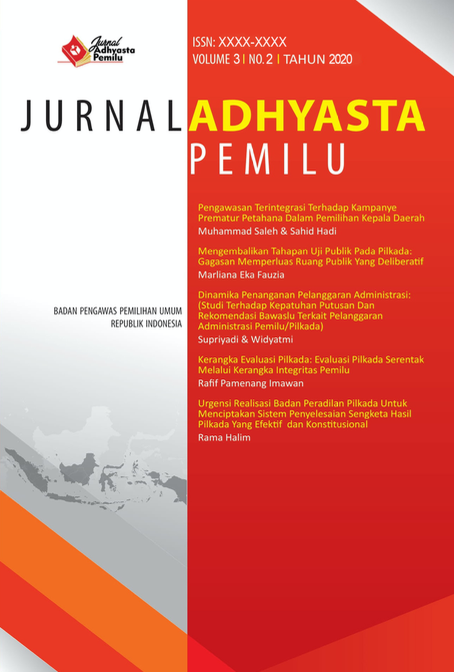Mengembalikan Tahapan Uji Publik Pada Pilkada
Gagasan Memperluas Ruang Publik Yang Deliberatif
DOI:
https://doi.org/10.55108/jap.v3i2.14Abstrak
The writing of this article is intended to evaluate the urgency of revising the Pilkada Law, on eliminating public examination points. The DPR removed public test points in the revision of the Election Law No. 1 of 2015, and was replaced by the Election Law No. 8 of 2015. Until the current election law No. 10 of 2016 there has been no re-discussion regarding the stages of public testing. The public test is a stage of competency and integrity testing for candidates for regional head and representative in an open manner which is independently formed by the Provincial / Regency / City KPU. Public test points were removed on the grounds that they were inefficient and time consuming. Based on this, the authors identify that the elimination of public testing can limit public participation in deliberative public spaces. And if the public test is returned at the election stage, it can improve the quality of democracy. As a theoretical review in this article the writer uses the concept of public space. While the research method uses qualitative through literature study. The results of this paper indicate that it is important to maintain a public test mechanism to restore the public space for the implementation of the elections. The existence of this public space ensures that there is space for public participation, the public can find out the track record of the candidates, build communication between candidates and voters and that public trials can be used as a deliberative campaign. Therefore, the public test can be returned to the election mechanism by adding a committee from various elements of society (farmers, laborers, entrepreneurs, village heads, educators, students and other elements of civil society). So that the public test becomes the preliminary election before the election day takes place.
Unduhan
Unduhan
Diterbitkan
Cara Mengutip
Terbitan
Bagian
Lisensi
Hak Cipta (c) 2020 Marliana Eka Fauzia

Artikel ini berlisensi Creative Commons Attribution 4.0 International License.



